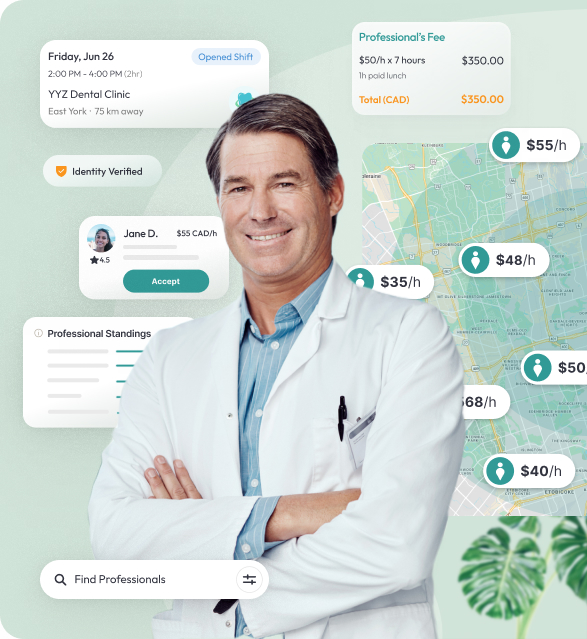Can a Hygienist Own a Dental Practice — Breaking Down the Possibilities
Challenges Faced by Dental Practice Owners
Can dental hygienists own their own practice? Yes, owning a dental practice provides the chance for dental hygienists to oversee their time and income; nevertheless, it also involves substantial responsibility and risk. RDHs frequently face a range of challenges, including:
Increasing Competition
With the rise in the number of dental clinics and practices, consumers have become more informed and discerning. To attract and retain clients, dental practice owners should offer:
- High-quality services;
- Reasonable pricing;
- Convenient location and operating hours;
- Additional benefits such as loyalty programs, discounts, and gifts.
It is crucial to stand out among competitors and establish a unique practice image.
Evolving Technology
In the realm of dental hygiene practice, dentistry is a dynamic and innovative field that requires constant updating of equipment, software, and treatment methods. While this enhances efficiency and safety, it also increases costs for investments and staff training.
Staff Recruitment and Retention
Personnel is a key factor in the success of a dental practice. However, finding and retaining qualified, responsible, and loyal professionals is not easy. Dental practice owners face challenges such as:
- High employee turnover;
- Shortage of specialists in the market;
- Team conflicts;
- Low productivity.
Patient Expectations and Experience
Modern patients demand high quality, speed, and comfort in dental care. They expect:
- Personalized approach;
- Comprehensive health information;
- Accessibility and transparent pricing;
- A pleasant clinic atmosphere.
Practice owners need to improve patient satisfaction and build trustful relationships with them.
7 Tips for Dental Hygienists Owning a Practice
If you are an independent dental hygienist who is opening or already owns a dental practice, it’s important to consider the aforementioned challenges and find effective ways to address them.

Here are a few pieces of advice for business development in the field of dentistry:
Setting Specific Goals for Dental Practice Growth
For successful dental business management, it’s crucial to establish goals for the short, medium, and long term. Goals should be SMART — specific, measurable, achievable, relevant, and time-bound. For instance, you could set the following objectives:
- Increase the number of patients by 10% in the next quarter.
- Improve service quality by 15% within six months.
- Implement new technology within a year.
Setting goals will help determine priorities, plan actions, monitor progress, and assess outcomes.
Attracting and Retaining Competent Employees
As previously mentioned, staff are a key factor in the success of a dental practice. To attract competent employees, pay attention to their recruitment, training, and motivation. Here are a few tips:
- Seek specialists who align with your mission, values, and culture;
- Provide opportunities for your staff’s development, career growth, and skill enhancement;
- Recognize employees for their good work, offer feedback, and consider their opinions and suggestions;
- Foster an atmosphere of trust, respect, and collaboration within your team.
Sometimes, you may need to quickly find a replacement for an employee who is sick, on vacation, or has resigned. Additionally, there might be an increased demand for services during holidays or seasonal promotions. Temporary staffing proves valuable in these instances for a dental hygienist owning a practice.
Temporary staff consists of professionals who work for a short period or on a project basis. The benefits of temporary staffing are evident, as these individuals can help you:
- Maintain service quality;
- Handle peak workloads;
- Fill gaps in your schedule.
Streamlining Dental Practice Processes
To enhance the efficiency and productivity of your dental hygienist’s own business, consider utilizing:
- Automation of routine tasks, such as patient appointments and reminders;
- Standardization of treatment protocols and quality control;
- Integration of various systems and software, such as electronic medical records and patient management systems;
- Delegation of responsibilities and authority to employees;
- Monitoring and analysis of key performance indicators of your dental practice.
Effective Marketing and Branding Strategies
Promote your independent dental hygiene practice and create a recognizable brand to attract and retain clients.

For instance:
- Establish your own website, blog, or social media page where you can publish information about dentistry, patient reviews, news about your practice, and more.
- Employ SEO, PPC, or email marketing to attract potential clients to your website or page.
- Participate in local events, sponsor charitable actions, or organize contests and giveaways to increase your practice’s recognition in the local community.
- Develop a unique logo, slogan, corporate style, and color scheme for your practice that reflects your mission, values, and advantages.
Adoption of Advanced Dental Technology
Incorporating cutting-edge dental technologies into your practice can provide numerous benefits. Here are some advanced dental technologies available for implementation:
- Digital radiography: A diagnostic method that uses digital sensors instead of traditional film for imaging teeth and jaws. Advantages include higher image quality, reduced radiation exposure, faster results, and the ability to process and store images digitally.
- 3D printing: A technique for creating physical objects from digital models using a specialized printer. Benefits include high precision, speed, customization, and cost reduction.
- Laser therapy: A method of treating oral conditions using laser beams. Advantages include painlessness, sterility, minimal bleeding, swelling, and accelerated healing.
Engaging with the Local Community
Building trust, loyalty, and attracting new patients can be achieved by engaging with the local community where your practice operates. Consider the following community engagement strategies:
- Offering free consultations and screenings to underserved population groups;
- Organizing lectures and seminars on oral health prevention and treatment for students;
- Collaborating with local health and education organizations;
- Supporting local sports, cultural, and relevant events related to your specialization.
Building Strong Referral Networks
Creating robust referral networks with other dental and medical specialists can help expand your client base and increase revenue.

Collaborate with:
- Orthodontists, implantologists, surgeons, and periodontists who provide additional treatment options for patients;
- Therapists, endocrinologists, cardiologists, and gastroenterologists who help identify and address oral health issues related to overall health;
- Psychologists, psychotherapists, neurologists, and others assisting patients in overcoming dental-related fears and anxiety.
Frequently Asked Questions
How can I learn from established clinic owners and benefit from their experiences?
Here are some key recommendations:
- Attend professional events such as conferences, seminars, and webinars where you can listen to presentations, interact with colleagues, and ask questions;
- Subscribe to podcasts, video channels, social media platforms, and other sources where established clinic owners share valuable content;
- Work on contracts in different clinics to observe different approaches within teams and identify successful case studies.
What legal aspects do I need to address before opening a dental office?
Before considering whether a dental hygienist can open their own practice in Canada, it’s vital to tackle the subsequent legal aspects:
- Obtain a license for dental practice and certifications for equipment and materials;
- Choose a legal entity structure for your business;
- Register your business and obtain the necessary permits and documents;
- Establish contracts with employees, suppliers, and other stakeholders;
- Adhere to laws and regulations governing dental practice, healthcare, labor, and consumer protection.
In the context of thinking if a dental hygienist can open their own clinic, it’s vital to acknowledge that pursuing such an endeavor encompasses more than adhering to legal and regulatory standards.
Why is dental practice insurance important, and what should I look for in a suitable plan?
Dental practice insurance is crucial to protect your business from various risks that may arise during operations, including:
- Claims or lawsuits from patients due to errors or damages;
- Equipment, material, or property damage from incidents like fires, floods, theft, etc;
- Injuries or illnesses to your staff or visitors on your premises;
- Loss of income or business disruption because of unexpected events.
When selecting a suitable insurance plan, consider factors such as coverage types, policy limits, deductibles, premium costs, and the insurer’s reputation.
How can I secure financing for my dental startup, and what factors should I consider?
The question of whether a dental hygienist can open their own practice is closely tied to financial investments. To secure financing, consider the following options:
- Loans or credits from banks, credit unions, or other financial institutions;
- Grants or subsidies from government bodies, nonprofit organizations, or other donors;
- Investments or partnerships from private individuals or companies interested in your business.
When choosing financing for your dental clinic, consider factors such as the amount and term of financing, interest rates, repayment terms, requirements, restrictions, and potential consequences if obligations are not met.
What challenges are involved in staffing a dental practice, and how can web-based staffing platforms help?
Staffing a dental practice with qualified candidates can be challenging. Competition for top talent is high, and the recruitment and vetting process can be resource-intensive. Web-based staffing platforms can help by offering services and tools such as:
- Posting job vacancies with detailed requirements, conditions, and benefits;
- Using algorithms and filters to search and select suitable candidates based on various criteria;
- Gathering feedback and recommendations from other employers or professional colleagues about candidates.
What benefits can be gained from collaborating with industry experts in dentistry?
Collaborating with dental industry experts offers several benefits:
- Consultation, advice, recommendations, or support related to your dental practice;
- Training on new methods, techniques, technologies, or procedures in dentistry;
- Participation in scientific research, experiments, or projects;
- Access to exclusive resources, materials, or equipment;
- Expanding your professional network and creating valuable contacts.




